Trump tells Tehran residents to immediately flee
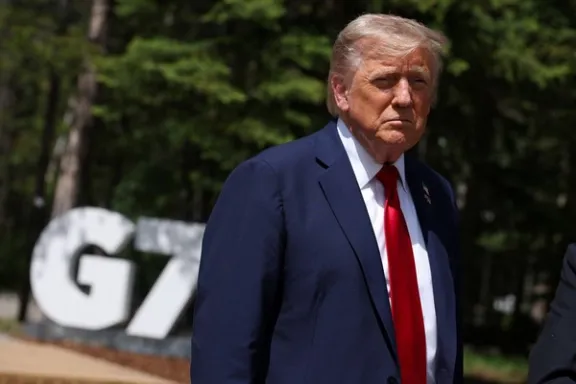
US President Donald Trump on Monday called for an exodus from Tehran in a major escalation to the Iran-Israel conflict which was entering its fifth day.

US President Donald Trump on Monday called for an exodus from Tehran in a major escalation to the Iran-Israel conflict which was entering its fifth day.
"Iran should have signed the 'deal' I told them to sign. What a shame, and waste of human life. Simply stated, IRAN CAN NOT HAVE A NUCLEAR WEAPON. I said it over and over again!" Trump said in a post on Truth Social.
"Everyone should immediately evacuate Tehran!" he added.
"AMERICA FIRST means many GREAT things, including the fact that, IRAN CAN NOT HAVE A NUCLEAR WEAPON. MAKE AMERICA GREAT AGAIN!!!"
Trump was set to depart a G7 summit in Canada to address the crisis, White House spokeswoman Karoline Leavitt wrote on X.
"Because of what’s going on in the Middle East, President Trump will be leaving tonight after dinner with Heads of State."
Israeli Defense Minister Israel Katz said earlier on the day that while Israel does not aim to harm civilians, residents of Tehran must evacuate areas near government and military sites that could be targeted.
An illustrated depiction of the Tehran evacuation zone published by the Israeli military encompassed an area around 30 square kilometers, an area home to several hundred thousand people.
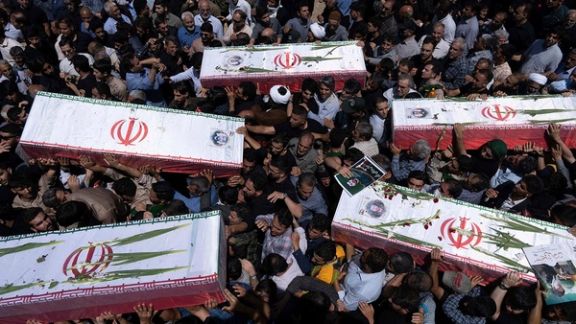
Israel stepped up its attacks against Iran on Monday with an attack on state media headquarters as the Israeli military ordered an evacuation of a large swath of Tehran and Prime Minister Benjamin Netanyahu called for regime change.
Iran kept up its salvos of missile fire on Israel which have killed at least 24 people since the start of the conflict, while US President Donald Trump called for an exodus from Tehran.
"Iran should have signed the 'deal' I told them to sign. What a shame, and waste of human life. Simply stated, IRAN CAN NOT HAVE A NUCLEAR WEAPON. I said it over and over again!" Trump said in a post on Truth Social.
"Everyone should immediately evacuate Tehran!" he added. Still, French President Emmanuel Macron told reporters Trump had proposed an Israel-Iran ceasefire "to get a ceasefire and to then kick-start broader discussions."
Meanwhile Israeli Prime Minister Benjamin Netanyahu told Iran International that Israel's military campaign against Iran is giving its people a chance to topple the Islamic Republic, adding that the ruling system's days were numbered.
"A light has been lit—carry it to freedom,” Netanyahu said.
“This is the time,” he said. “Your hour of freedom is near—it’s happening now.”
While there have been some chants of "death to the dictator" cursed by residents from apartment blocks in Tehran by night according to videos sent to Iran International, so far no cases of concrete defiance of the Iranian system.
Iran's judiciary warned of harsh punishment for any unrest.
Netanyahu had previously mooted assassinating Iran's Supreme Leader Ali Khamenei in an interview with ABC News.
Khamenei's death "is not going to escalate the conflict, it's going to end the conflict," Netanyahu said.
Iran's Foreign Minister Abbas Araghchi said Tehran was still interested in diplomacy but focused on confronting Israel, a day after he visited his ministry which was bombed by Israel earlier in the day.
Before Trump's threat, earlier on Monday Israeli Defense Minister Israel Katz said that while Israel does not aim to harm civilians, residents of Tehran must evacuate areas near government and military sites that could be targeted.
An illustrated depiction of the Tehran evacuation zone published by the Israeli military encompassed an area around 30 square kilometers, an area home to several hundred thousand people.
Israeli attacks since Friday had killed 224 people and wounded 1,277, spokesman for Iran’s health ministry Hossein Kermanpour said on social media on Sunday.
More current death tolls from Iran were not immediately forthcoming.
State TV attack
Israel bombed the Islamic Republic of Iran Broadcasting (IRIB) headquarters in Tehran on Monday, briefly knocking its main news channels off the air and igniting a fire that continued burning late into the night.
The strike targeted a facility used by Iran’s armed forces “to advance military operations under civilian activity,” Israel's military said.
A video sent to Iran International showed smoke still pouring from the building after nightfall.
A state media presenter denounced the attacks as they were occurring during a live broadcast, only for a large blast and a plume of smoke to send her fleeing the set as crew members defiantly chanted, "God is great!"
The Israeli military also said it destroyed two Iranian F-14 fighter jets were struck on Monday during airstrikes against an airport in Tehran.
Call for diplomacy
Iran's foreign minister Abbas Araghchi told three European counterparts that Tehran is serious about diplomacy and never left negotiating table but that its focus now was to confront Israel's "aggression", state media reported on Monday.
A sixth round of US-Iranian talks set for Sunday was cancelled but Tehran has yet to close the door on their resumption definitively.
Earlier on Monday, Trump said he still hoped for a negotiated solution.
"As I've been saying, I think a deal will be signed, or something will happen, but a deal will be signed, and I think Iran is foolish not to sign," Trump told reporters on Monday while attending the G7 summit in Canada.
Foreign ministers of 22 Arab and Islamic nations called for an immediate halt to Israel’s campaign against Iran on Monday, warning of serious harm to region.
The states including Turkey, Saudi Arabia, and Egypt - traditional rivals of Tehran - urged respect its neighbor's sovereignty and of international law.
“Diplomacy and dialogue are the only viable path,” the statement said, urging a return to nuclear talks
5,000 Israeli deaths previously forecast
A former senior Israeli military official told Iran International that the Iranian response so far was far more muted than what it would have expected in a full-on clash.
“We had estimated 5,000 deaths - we expected more barrages - and the risk of Hezbollah and the Houthis joining in simultaneously,” said Miri Eisin, a senior fellow at the International Institute for Counter-terrorism and a retired Israeli colonel.
“We do a guesstimate of what they can do based on worst case scenarios and expecting that the system is overwhelmed. You have to have the estimates as the hospital needs to be ready."
Meanwhile eight members of Iran’s Islamic Revolutionary Guard Corps (IRGC) and Basij forces were killed in the early hours of Monday in Khondab, in central Iran amid what authorities described as “attacks and insecurity caused by the Zionist regime."
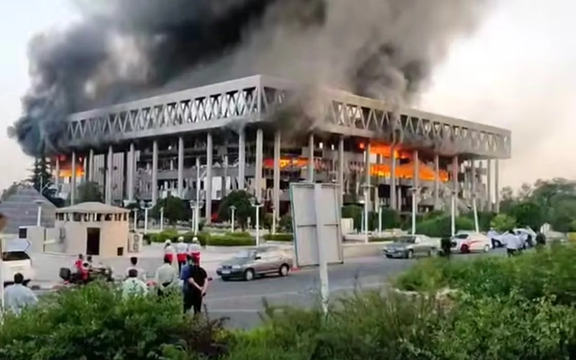
Israel’s military confirmed it bombed the Islamic Republic of Iran Broadcasting (IRIB) headquarters in Tehran on Monday, knocking its main news channels off the air and igniting a fire that continued burning late into the night.
Israel’s military said the strike targeted a facility used by Iran’s armed forces “to advance military operations under civilian activity.”
A video sent to Iran International showed smoke still pouring from the building after nightfall.
A sprawling and modern office complex, the state media headquarters oversees several channels and is viewed by Tehran’s detractors as a key pillar of the Islamic Republic’s control over society.
The building most affected was the Glass Building, the network’s central studio complex, named for its transparent walls.
The strike followed a public warning by the Israeli military’s Persian-language spokesperson, who called on residents of Tehran’s District 3 to evacuate hours before the attack.
An IRIB presenter confirmed that at least four bombs hit the broadcaster's compound. “The missile hit the office of [IRIB chief] Peyman Jebelli,” he said. “Jebelli was in the newsroom at the time and survived.”
The 21:00 nightly news—the Islamic Republic’s most prominent broadcast—was canceled for the first time in 43 years Monday night.
Earlier, IRIB announced its 20:30 bulletin could not air due to the damage. Multiple interruptions hit the News Channel’s live coverage, and the broadcasts were moved to alternative studios, but the extent of the casualties remains unclear.
An IRIB reporter said only several colleagues were injured. However, Hamshahri, a Tehran-based daily affiliated with the municipality, reported that several employees were killed in the attack.
Israeli Defense Minister Israel Katz posted on X: “The Iranian regime's propaganda and incitement broadcasting authority was attacked by the IDF after a widespread evacuation of residents in the area. We will defeat the Iranian dictator everywhere.”
IRIB’s symbolic and operational role in the Islamic Republic made the strike particularly significant.
Following the on the IRIB headquarters, a surge of celebratory reactions flooded social media and Iran International.
Videos neighborhood captured chants of “death to the dictator” and “death to Khamenei” ringing out from windows around the IRIB complex.
The attack on the state broadcaster underscores a major shift in Israel’s strategy: targeting not just military infrastructure, but the ruling system’s institutions.

US President Donald Trump said Iran was on the backfoot in its four-day-old war with Israel and that Tehran needed to quickly resort to diplomacy.
“Iran is not winning this war," Trump said at the G7 summit in Alberta on Monday. “They should talk — and they should do it immediately,” he warned.
Tehran had fallen afoul of a two-month deadline he had set for them making concessions on their nuclear program in talks, he added. “They had 60 days and on the 61st day we didn’t have a deal.”
Iran is now pushing for renewed negotiations, Trump said.
Asked what would prompt direct US military involvement, Trump refused to elaborate: “I don’t want to talk about that.”
But his support for Israel was unequivocal. “We’ve always supported Israel,” he said. “Israel is doing very well right now.”
The comments came as the war entered a dangerous new phase, with both sides stepping up deadly attacks and Israel targeting Iran's state broadcasting headquarters.
Israeli Prime Minister Benjamin Netanyahu told ABC News that assassinating Iran’s Supreme Leader Ali Khamenei “is not going to escalate the conflict, it’s going to end the conflict.”
Despite the rhetoric, there are signs of diplomatic maneuvering. According to the Wall Street Journal, Iran has conveyed to Arab intermediaries that it is willing to resume nuclear negotiations—on condition that the US does not join Israel in further strikes.
“Iran has told Arab officials they would be open to returning to the negotiating table as long as the US doesn’t join the attack,” the officials said, according to the newspaper.
Messages relayed to Israel warned “it is in the interest of both sides to keep the violence contained.”
Iran, according to a Reuters report, has asked Qatar, Saudi Arabia and Oman to urge Trump to pressure Israel into a ceasefire, offering concessions on the nuclear file in return.
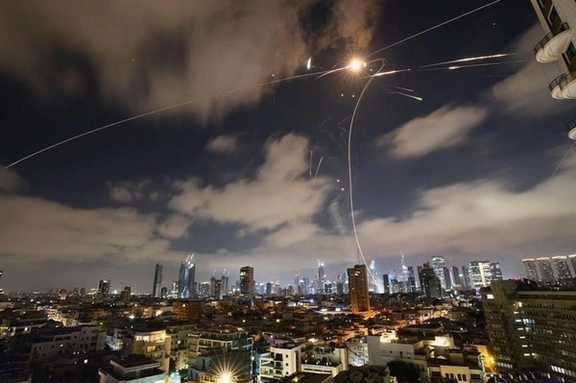
Israel's leadership had braced for around 5,000 civilian deaths in an all-out war with Iran but has found its foe unable to wreak serious damage, former senior intelligence officer Miri Eisin told Iran International.
"If you put aside the human story, in general, life totally exists here, you can go out, there is food in the stores," said Eisin, a senior fellow at the International Institute for counter-terrorism and a retired colonel of the Israeli Defense Forces. Nobody is happy but the stress has not brought panic. That’s amazing in itself.”
Still, Iran’s retaliatory attacks are far heavier than the two last year when Iran first launched direct attacks on Israel, with missile payloads ranging from 500kg to a ton, says Eisin, who served as the first female Deputy Head of the Combat Intelligence Corps.
“We had estimated 5,000 deaths - we expected more barrages - and the risk of Hezbollah and the Houthis joining in simultaneously,” Eisin said, while as of Monday, the government cited just 24 fatalities.
“We do a guesstimate of what they can do based on worst case scenarios and expecting that the system is overwhelmed. You have to have the estimates as the hospital needs to be ready."
“Right now Iran has fired 370 missiles and 30 got through. If it hits urban areas you see the devastation there, but Israel continues to intercept more than 90% with its air defense systems which is amazing,"
The Israeli military on Monday said it had destroyed one third of Iran’s surface-to-surface missile launchers.
Delayed response
Israel’s strategy to create havoc among Iran’s command and control personnel was key to Israel's strategy, she said, a move which takes 12-15 hours to recover from.
In the first wave of attacks on Friday morning, Israel killed the senior leaders of Iran's military and struck at air defenses, missile sites and two nuclear facilities.
“I was expecting an immediate Iranian response and the lack of that is because we took out all that hierarchy and it takes several hours to get that back, hence the response was only from around 9pm and onwards,” she said.
The attacks from Iran have predominantly hit civilian targets, all the 24 deaths so far in heavily populated urban centers. Rescue service Magen David Adom said that it has dealt with a total of 708 casualties as of Monday.
Eisin said that like in Syria, many of Iran’s military and nuclear sites are deep underground and buried in urban areas, meaning that in spite of Israel sending warnings, there will also be a human toll on the Iranian side.
Multiple neighborhoods of Tehran have seen an exodus since Friday after massive strikes across the capital and Iran's health ministry said 224 Iranians have been killed since Friday, and more than 1200 injured - 90% civilians.
Israel's campaign focused on it's nemesis's nuclear program, Eisin said, and the surprise attack aimed to pave the way for Iran to make concessions in a negotiated settlement.
“The end game here is nuclear and the diplomatic channels for that are already working,” she said.
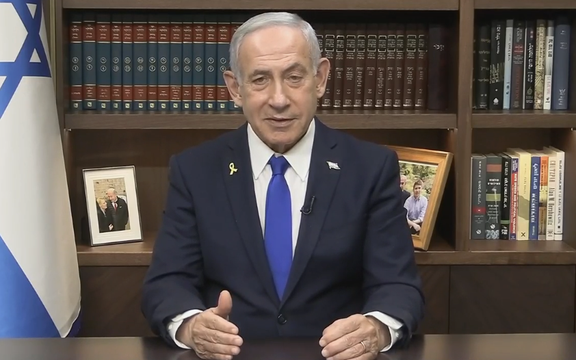
Israel's military campaign against Iran is giving its people a chance to topple the Islamic Republic, Israeli Prime Minister Benjamin Netanyahu told Iran International, adding that the ruling system's days were numbered.
"A light has been lit—carry it to freedom,” Netanyahu told Iran International's anchor Pouria Zeraati on Monday.
“This is the time,” he said. “Your hour of freedom is near—it’s happening now.”
Netanyahu cast the Islamic Republic as an enduring threat to Israel through its nuclear and ballistic missile programs.
“The tyrants of Tehran basically planned two weapons of mass death to exterminate Israel,” he said. “One is to rush forward with their nuclear program to develop atomic bombs to destroy Israel."
"Second, they've programmed to build a vast missile, ballistic missile arsenal … Each missile carrying a one-ton payload, just slamming into our cities, killing our women, our children. They were going to build 20,000 of these,” he added.
Netanyahu framed Israel’s ongoing campaign as both a defensive war and an opportunity for the leadership in Tehran to be overthrown.
“This is evil against good, and it's time for good people to stand up with the good, the good people of Iran, and good people everywhere against this madness foisted on all of us by this radical tyranny. It's about to end,” Netanyahu said.
Israeli attacks since Friday have killed 322 people and wounded 684, according to human rights group HRANA.
'They fear us, they fear you'
The Israeli premier suggested that the Islamic Republic’s military vulnerability could also hasten its political collapse.
“These dictators in Iran, sure they fear us—but they fear you, the people of Iran, even more,” he said. “They understand that 80 percent of Iranians despise them."
Netanyahu said Israel’s precision targeting had already knocked out key parts of Iran’s nuclear infrastructure and missile production capabilities.
“(We) knocked out their chief nuclear team, their nuclear sites… we're knocking out their ballistic missile production,” he said. “We still have a way to go, but we’ll finish it.”
Drawing a contrast between Israel’s military conduct and Iran’s, Netanyahu said, “You can see that by the warnings that we are sending. The forewarnings that we're sending to the people of Tehran and elsewhere.
"It is necessary in order to have the people leave the zone of conflict. That's the whole difference between a terrorist regime that deliberately targets civilians in a democracy like Israel.”
Israeli Defense Minister Israel Katz said earlier on the day that while Israel does not aim to harm civilians, residents of Tehran must evacuate areas near government and military sites that could be targeted.
An illustrated depiction of the Tehran evacuation zone published by the Israeli military encompassed an area around 30 square kilometers, an area home to several hundred thousand people.
Netanyahu said the people of Iran had suffered under the Islamic Republic and mentioned a young woman whose death in morality police custody sparked nationwide protests in 2022.
“They've impoverished you. They've given you misery. They've given you death. They've given you terror. They shoot down your women, leaving this brave, unbelievable woman, Mahsa Amini, to bleed on the sidewalk for not covering her hair. I mean, this is an outrageous radical fanatic regime, and the time has come to defang them.”
Netanyahu said Iran could be made "great again" and that Iran's people were its future.
“I believe in you. I respect you. I admire you. I know your achievements. I know your potential. I know that Iran can be great again. It was a great civilization, and these theological thuggery that has kidnapped your country, will not stand for long, and you are the future, not them.”